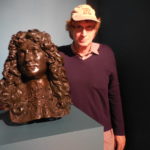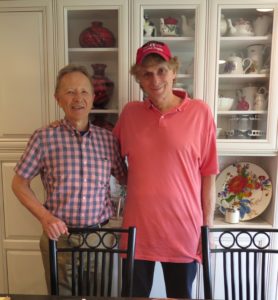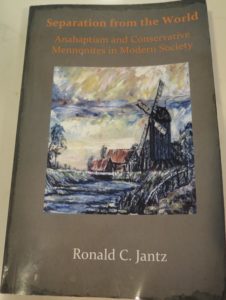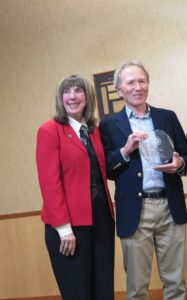NJ Discover Spotlight: Defining Eclectic: Ron Jantz, PhD (Rutgers), MLS (Rutgers) Digital Library Architect – Rutgers University Libraries, MA (Michigan) Mathematics, BS, (Kansas) Mathematics, Bell Labs (Dept Head), Pilot, Author, and Biker, across Kansas. By Calvin Schwartz July 9, 2019 

pre interview with Ron Jantz on a late June Saturday morning Green Room
Germane to my spotlight interviews is how they evolve. A few months ago, meeting Grace Agnew from Rutgers Alexander Library, joining us for campus breakfast was Ron Jantz. Fifty-nine minutes later, a copy of his second book (in pre-publication), ‘Separation from the World: Anabaptism and Conservative Mennonites in Modern Society,’ was passed across the table divide to me. Then in May, I was invited to the Annual Award Dinner at Rutgers School of Communication and Information, honoring Ronald C. Jantz, who also discussed “Vision and Innovation in Research Libraries: Making Room for Passion, Ingenuity and Self-Direction.” Guess what? Fascinating and part of a brave new world unfolding (not unraveling). At the banquet dinner table, Ron invited me to join him in June on an eight-day bike-ride across Kansas. By pre-arrangement, they (hundreds of bikers) sleep on the floor of Kansas high school gymnasiums. I don’t do floor sleeping, but I knew there was an interview with Ron when he got back.

RON JANTZ, PhD
INTERVIEW:
A hot late June Saturday, approaching 90 degrees. Interviews take their own form. Next to me on the table was a copy of Ron’s second book, ‘Separation from the World……Mennonites in Modern Society.” Also, my notes on the chapters read. I mentioned fascination, surprise at the relevance to modern, future living that his book delivered. I didn’t expect it. Ron smiled. We weren’t beginning in Kansas where he was born.
“I am ethnic German, Dutch, Mennonite, but non-practicing.”
“Mennonite? Define.”
“The Mennonite religion is named after Menno Simons, a Dutch Catholic priest who left his order to become an Anabaptist, one who believes in adult baptism. Menno became a hunted man in the mid-sixteenth century and many of his compatriots were executed by the Spanish Catholic authorities. It turns out that there are many different Mennonite congregations, some progressive and some very conservative. My parents and grandparents were members of one of the most conservative congregations founded by John Holdeman… 20,000 members in the US, maybe 5000 in Kansas. The Holdeman people have a culture of humility, modesty, generosity, and peaceful living. They follow the sixteenth century Anabaptists in their practice of separation from the world and nonresistance. But my mother was a quiet rebel…. ultimately leaving the church.”

My first meeting with Ron Jantz, breakfast Rutgers campus, with Grace Agnew, Ronald Becker, Alexander Library

In reading his book, I saw a description of ‘non-resistance.’ “It’s much more than pacifism, and turning the other cheek. In World War I, 200 Mennonites ended up in Leavenworth prison for refusing induction…They don’t vote because if you did vote, the elected authorities then have power to involve you in military actions… Anabaptists are separated from the world… God will take care of evil… They don’t typically buy insurance, but they are learning to compromise a bit so they buy crop insurance… It’s called “drift” into modern society.”
Ron’s family left the church, but there was always much pressure from relatives to return to the Holdeman faith.
I thought this was all so intriguing as I often examine our world, conspicuous consumption, environmental challenges. I told Ron how ‘heavy’ yet relevant his book is. He explained further, that there is a suppression of ego; you can’t take pictures of people but photos of things to help in you work are permissible (e.g. a sick cow or tractor requiring maintenance). It’s alright to smile but laughing out-loud is un-Christian. And for hundreds of years, no one from the outside is allowed into their society unless they agree to be re-baptized. The Holdeman people are recognized by their dress – the men always have a beard and the women, a head covering.

Ron Jantz, with Grace Agnew, Special Advisor for Strategic Initiatives, Library Administration
We briefly touched on the 400-year history of the Mennonites going back to Europe, Holland and Prussia and how they were so discriminated against. Then, it was time to jump to Kansas, where Ron was born. “Holdeman’s did not go to high school; only eighth grade. I was good at science and math so I went to high school. Afterwards, it was suggested that I go to a Mennonite college, Bethel. I also lettered in three sports, track, football and basketball. My high school football coach and English teacher said, to go to the University of Kansas, where I majored in math.”
Our conversation drifted (with prodding from me) into ‘inexplicable;’ that which we can’t understand or explain; perhaps spirituality (part of my second novel). “Bell
Labs was on the KU campus. I was invited to visit them in New Jersey… Flew there, and they hired me after I graduated Kansas. It was 1965… They helped me go for a Master’s Degree at the University of Michigan in math in 1967.”

Ron on June 2019 Bike ride across Kansas, dipping feet in Missouri River

A Kansas scenic view from bike ride
Ron became a supervisor and department head at Bell Labs which ultimately became Lucent, with 45 people working for him. “I was good technically, but not sure about being a good people manager. At this juncture I knew I wanted to return to academia… Kept on seeing positions for Masters in Library Sciences… Burn-out was arriving as I was working 60 hours a week… Lucent offered 70,000 employees a buy-out… By 1995, I logged 30 years with Bell Labs… They gave me a year salary and paid my tuition at Rutgers… So, on January 13, 1996, a Friday, I took the buy-out and the following Monday, I was in Library school.”
It took Ron 1 ½ years to get his Masters in Library Sciences. “In 1997, Rutgers Library hired me where I spent the next 22 years, leading to a very enjoyable and rewarding second career. In library school, I interacted with Professor Tefko Saracevic from Rutgers School of Communication and Information. He urged me to go for my PhD. I talked to him about the GRE which I passed in 1966 for graduate school at Michigan. I was concerned about having to re-take the GRE exam. The Educational Testing Service suggests that your grades don’t change much over decades.”

Ron Jantz 2nd book: ‘Separation from the World: Anabaptism and Conservative Mennonites in Modern Society
I’m thinking to myself how driven and resolute Ron is. I sensed where he was now going. “I sent the receipt, scores from my 1966 GRE and quotes from the Education Testing Service. They accepted my 1966 score…. And I thoroughly enjoyed studying for my PhD… My first book was my dissertation. ‘Managing Creativity,’ Been converting myself to sociology with a technology emphasis…an idea to complement the library refence desk with AI robots.”
I like the notion of a breath of fresh air and rugged individualism. The more I listened to Ron, the more convinced, it defined Ron Jantz, replete with traditional academic pursuits, math, library, writings, and familial history. “I appealed to the IRS that when I studied at Michigan in the 1970’s, my salary should not have been taxed. They agreed, so I received a substantial refund. I took the money and got my pilot’s license.” His flying was limited to short hops mostly to Pennsylvania and small airports in New Jersey. He stopped flying a few years ago but explained when he’s up there, it’s deeply religious. You’re just closer to God.
“Back to your book. How long did it take and why write about the Holdeman religion?” Ron’s research and professional journey took him from math to computer science and then to library science. In this journey, a latent interest emerged about how social groups change and innovate, leading to his dissertation about innovation in nonprofit groups and, specifically, research libraries. His regression analysis of research libraries led to some interesting findings. For example, the more integrated the senior leadership team is, the more innovative the library becomes. After completing the PhD, he continued studying nonprofit groups by turning his interest to a religious group, the Holdeman Church, and how, or if, they have changed.

Ron Jantz with Dr Marie Radford, Chair and Professor, Rutgers Department of Library and Information Science at Annual Award Dinner

Ron Jantz presented Rutgers Universirty SC& I Distinguished Alumni 2019
“It took me three years to write it the book and interesting issues emerge about citizenship and nonresistance… I think the Holdeman’s get by because they are relatively invisible in today’s society… Yes, their WWII views were naïve and dangerous.” But perhaps these views are becoming even more relevant in today’s emerging nationalistic governments.
“Take a deep breath Ron. We’re going 180 degrees way from academia and Rutgers. Some personal insights. Before I leave this earth, I won’t be satisfied until I…….”
“I need to learn how to accept… All the stuff going on in his world, I would like to feel I contributed to a solution. I felt that librarianship does contribute more to society, but I’m not quite there yet.”
“Living or dead, who’d you like to have dinner with?”
Perhaps two seconds elapsed. “Leo Tolstoy. He was connected to Mennonites. At one point he was leaning towards them.”
Then Ron volunteered his own question. “If I came back as an animal, what? An eagle. They soar.”
“Five things in life you can’t live without?”
“Books. Solitude. Happiest when I have something big in front of me. A few strong emotional connections to people. Sleep.”
“I need to know more about what I missed by not biking across Kansas.”
“They’ve (BAK-Bike Across Kansas) have been doing this for 45 years. This year we had some bad weather. It was cold. Some ice pellets in the rain…. Not sure about next year.”
Ron and I actually spoke a few years ago comparing notes on our battles with A-Fib. As synchronicity would have it (inexplicable), we shared the same electro-physiologist physician who successfully performed ablation on our hearts which means we are bonded beyond the almost four hours we just spent together. It magically flew by. Ron and wife Leona live in suburban Monmouth County.
As he was getting ready to leave, I mentioned, “I’ll see you at Alexander Library in August when I’m there to do a library interview article.”
“I won’t be there. I’m retired now.”
“How can that be?”





